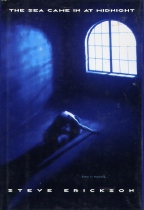 |
 Steve Erickson
Steve Erickson
The Sea Came In At Midnight
Reviewed by: Rick Kleffel © 2005
Bard Books / Avon Publishing
US Hardcover First Edition
ISBN 0-380-97766-4
Publication Date: 05-01-1999
259 Pages; $23.00
Date Reviewed: 03-06-05
Index:
General Fiction
Science Fiction
Fantasy
Though we experience time as an unstoppable march forward, one relentless second after another, our memory knows no such restrictions. Nor does the fiction of Steve Erickson. Perhaps that's why his books enter the psyche as if burrowing up from beneath rather than being seen by the reader from above. Reading itself is an act that's very close to the experience of memory, and if you're reading a novel by Erickson the distinction between the two becomes negligible. Past, present and future mix, merge and lead to one another through transparent prose wormholes. Characters slide in front of you, follow you, become you. Identity is a thing of the moment, and in memory, moments can be artfully re-arranged. Rarely are they arranged as artfully as Steve Erickson manages in 'The Sea Came In At Midnight'. Erickson's labyrinth of a tale is at once zippy, moving, and endlessly evocative. Erickson's elegant loops and spirals ensnare the reader in memories so pure they seem to have been ejected onto the pages from an unlived part of the reader's life.
As with life, 'The Sea Came In At Midnight' isn't so much read as lived. Having escaped first from a small island town in the Sacramento River Delta, Kristin falls in with a cult that just needs one more woman to complete a 2,000-strong march over a cliff into the sea at midnight on December 31, 1999. But she manages to escape, and in so doing initiates the spiral that takes the novel back and forth in time across forty years. Within the novel's nautilus shell architecture, readers will find Kristin enslaved by an apocalypse-obsessed but otherwise anonymous man ensconced in a suburb in Southern California, a dream-mapper, a snuff-film maker, a worker in a memory hotel in Tokyo -- what, you didn't know about the revolving memory hotels in Tokyo? You'll certainly never forget about them after reading this novel.
Erickson expertly draws the reader in with easy-to-read, transparent prose with which he effortlessly creates characters who blossom to life in our memory. His characters -- Kristin, The Occupant, Lulu Blue, Carl the Cartographer, to name but a few -- multiply, blur, merge and emerge from his recursive chronology. Kristin's story unfolds one leaf at a time, overlapping and interlocking with other characters and other stories. Erickson's layered approach to character-building ensures the reader experiences head-rush revelations, as the complex relationships slowly unfold then in a moment become clear. Looking back on the novel, readers will remember the characters with the same force and detail that they remember people they once knew.
It's probably fair to say that Erickson's complex plot itself is a character in 'The Sea Came In At Midnight'. Erickson combines very up-close and personal moments with movements across a huge canvas of travel and time. From Paris to Japan, from the 1960's to post-millennial California, 'The Sea Came In At Midnight' jumps grandly but effortlessly from one peak to another. The true joy of this novel is in reading every single to find out where and when Erickson will shift his focus. For all the splinters and jump-cuts, Erickson operates on unassailable bedrock of intuition that feels very right. The novel has an improvisational feel, but it's the kind of improvisation that's the result of having perfected an art form.
For all the intensity and improvisation of his characters, his plot and his chronology, Erickson's actual prose is light-handed and enjoyable to read. He shows a nicely understated sense of humor, and a love of language that comes out in memorable jokes and phrases, such Kristin's favorite insult, calling people "point-missers". Though his concepts and his chronologies are sophisticated, and his language verges on poetic, Erickson's novel is easily read. If the reader surrenders to the chaos, and surfs on the wave of words, 'The Sea Came In At Midnight' is something of page-turner. As such, it's a wild, fun ride.
This is probably the key to really getting the most of out 'The Sea Came In At Midnight'. Yes, it is possible to accumulate every event, and pin them all on a map that starts at A and ends, well....quite a bit later. But from the first page, this book is a rush, deserves to be read in a rush, it needs to be dreamt, to be remembered, not reduced. Dive in. You won't be the same when you emerge. You'll have memories of other lives mixed in with yours. You'll find yourself able to look back on your own life, from that vantage point look forward, and once again able to look back. Once you experience Erickson's loops, those around you will become crystal clear. And a lot more fun to surf.
|
 |
